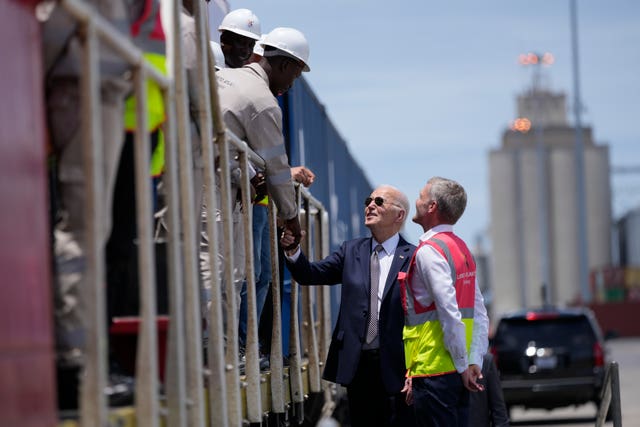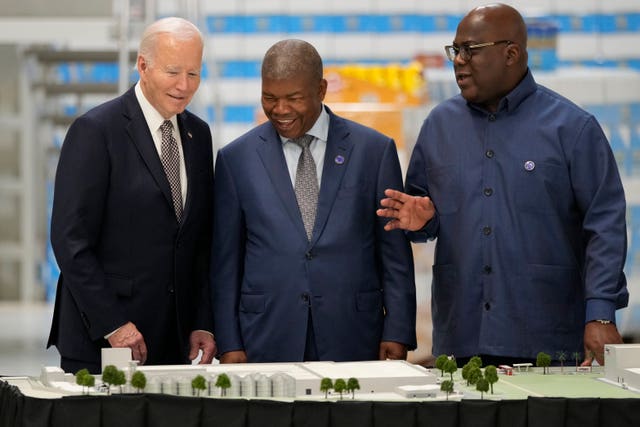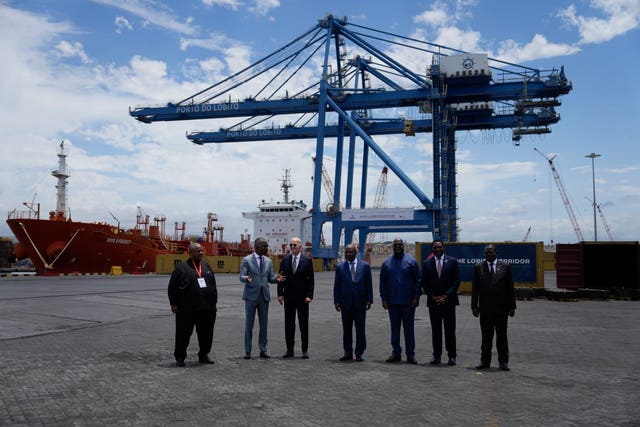
Even in the waning days of his presidency and thousands of miles from home, US President Joe Biden is finding ways to celebrate trains.
Mr Biden used the third and final day of his visit to Angola to showcase the Lobito Corridor railway, where the US and allies are investing heavily to refurbish 800 miles of train lines in Zambia, Congo and Angola.
The project aims to advance the American presence in a region rich in cobalt, copper and other critical minerals used in batteries for electric vehicles, electronic devices and clean energy technologies.

By the end of the decade, the rail line could even go a long way toward linking southern Africa’s western coast with the continent’s eastern edge.
“I’m probably the most pro-rail guy in America,” Mr Biden, the first US President to visit Angola, said during a speech on Tuesday evening.
Mr Biden has long had the nickname “Amtrak Joe” for the 36 years he spent commuting by US train from his home in Delaware to Washington while in the Senate.
He said the Lobito Corridor constituted the largest US investment in a train project outside his home country.

On Wednesday, Mr Biden flew from the Angolan capital of Luanda to Lobito on Africa’s western coast to tour port facilities linked to the corridor with Angolan President Joao Lourenco, Zambian President Hakainde Hichilema, Congolese President Felix Tshisekedi and Tanzanian Vice President Philip Mpango.
The leaders also planned to meet with representatives from companies that stand to benefit from the corridor project, including a telecommunication firm expanding cell service in the region, a food-production firm and Acrow Bridge, a Pennsylvania company that makes prefabricated steel bridges and has a contract to deliver nearly 200 to Angola.
Mr Biden would also see an American General Electric locomotive used for cargo on the Lobito Atlantic Railway, the White House said, with the US promoting the railway upgrade as a catalyst that it hopes will spark a new era of Western private sector investment in this part of Africa.
The Biden administration says the rail corridor will help business interests and counter China’s growing influence in Africa.
Today, I say to the people of Angola and all the people of Africa, there is nothing beyond our capacity if we do it together.
We can and will chart a future of great nations, worthy of the highest aspirations of every Angolan and every American. pic.twitter.com/U2BdCXQjNp
— President Biden (@POTUS) December 4, 2024
His long-awaited first trip to sub-Saharan Africa as President came in a week where trade tensions between America and China over rare minerals needed in new technologies went up a notch.
In Lobito, Mr Biden will announce 600 million dollars (£473 million) in new US investment for projects associated with the corridor, which has also drawn financing from the European Union, the G7 leading industrialised nations, a Western-led private consortium and African banks.
Mr Biden toured the Lobito port that will provide an outlet on the Atlantic Ocean and ideally a route to the West for Africa’s minerals and other exports.
Under a towering blue crane, a banner read: “The Lobito Corridor Connecting Africa from the Atlantic to the Indian Ocean.”
Mr Biden announced that Congo had also committed a new 553 million dollar (£436 million) direct loan to the railway to upgrade and operate more than 600 miles of tracks from Lobito to the Congo border.

The administration says it currently can take cargo loads of materials about 45 days to get from eastern Congo or Zambia to the market and usually involves going by truck to South Africa.
Test loads run using the new rail corridor made the same journey in around 40 to 50 hours.
China, meanwhile, already has heavy investments in mining and processing African minerals and has used its Belt and Road Initiative infrastructure strategy to promote its economic and political influence around the world.
In September, China said it had signed a deal with Tanzania and Zambia to revamp a separate railway line going east from Zambia to Tanzania’s Dar es Salaam on the east coast of Africa.
The countries had previously worked together to build the rail line in the 1970s, but it fell into disrepair. China’s move to renovate it – announced on the sidelines of this year’s China-Africa forum – is seen by some analysts as the Chinese response to the Lobito Corridor.

A senior US administration official called the Lobito Corridor the heart of competing with China – not as a political adversary, but from a business standpoint.
The idea is that rather than pumping in aid, Washington will attempt to grow US influence by promoting projects that can spark investment and therefore help communities and countries over the long haul.
The Lobito Corridor has become a model approach that the US is looking to replicate in other parts of the world, said the officials.
The corridor will not be completed for years, meaning much of the continued work would come during the administration of Republican Donald Trump, who takes office January 20.
The Biden White House says that Republicans in Congress and elsewhere have supported past efforts to promote African business interests through targeted investments and that such initiatives have appealed to Mr Trump and his key advisers in the past.


Why are you making commenting on The National only available to subscribers?
We know there are thousands of National readers who want to debate, argue and go back and forth in the comments section of our stories. We’ve got the most informed readers in Scotland, asking each other the big questions about the future of our country.
Unfortunately, though, these important debates are being spoiled by a vocal minority of trolls who aren’t really interested in the issues, try to derail the conversations, register under fake names, and post vile abuse.
So that’s why we’ve decided to make the ability to comment only available to our paying subscribers. That way, all the trolls who post abuse on our website will have to pay if they want to join the debate – and risk a permanent ban from the account that they subscribe with.
The conversation will go back to what it should be about – people who care passionately about the issues, but disagree constructively on what we should do about them. Let’s get that debate started!
Callum Baird, Editor of The National
Comments: Our rules
We want our comments to be a lively and valuable part of our community - a place where readers can debate and engage with the most important local issues. The ability to comment on our stories is a privilege, not a right, however, and that privilege may be withdrawn if it is abused or misused.
Please report any comments that break our rules.
Read the rules here